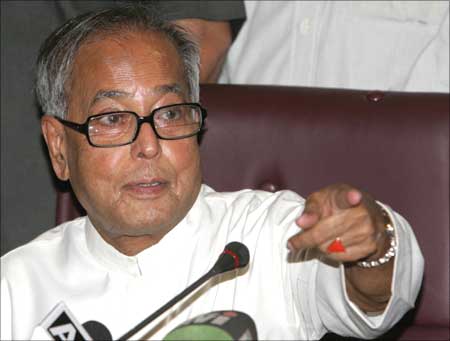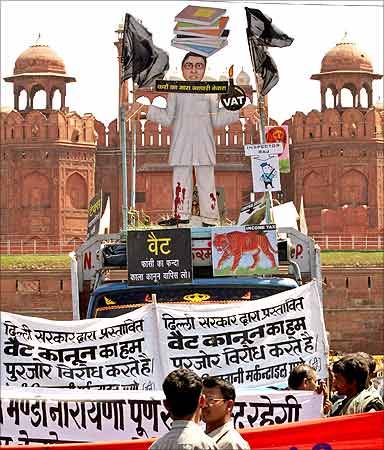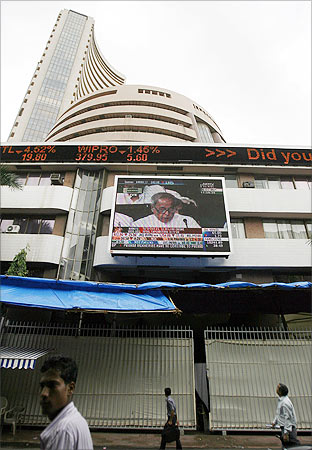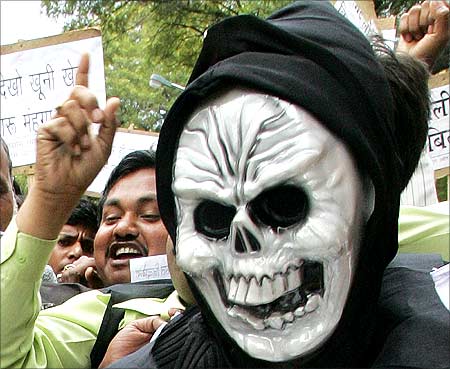Photographs: Reuters
Finance Minister Pranab Mukherjee on Wednesday proposed a three-rate structure for the Goods and Services Tax -- which will simplify the indirect tax regime -- under which goods will attract 20 per cent levy, services 16 per cent and essential items a concessional 12 per cent.
Mukherjee proposed these rates to the state finance ministers at a meeting in New Delhi to evolve consensus over GST that is planned to be implemented from April 1, next year.
All central and state taxes like excise, VAT and service tax will be rolled into GST, once the new regime comes into effect.
The revenue from GST will be shared equally between the centre and states, implying that out of 20 per cent tax proposed for goods, 10 per cent each would go to the centre and the state concerned.
Similarly, in case of services, the revenues would be equally shared between the centre and the state.
Besides the maximum rate of 20 per cent, Mukherjee has also proposed a lower rate of 12 per cent for essential items. This too will be shared equally between the centre and states at 6 per cent each.
While elaborating on the dual rate structure for goods, Mukherjee said, "The peak effective rate will be about 15 per cent which will be quite acceptable to the trade and industry."
. . .
Govt proposes 20% GST on goods, 16% on services
Photographs: Reuters
The 15 per cent could be the effective average rate as a result of the dual rates for goods.
The minister assured the states that the Centre would "step up the amount of compensation recommended by 13th Finance Commission should the need arise, based on a mutually agreed formula."
The Commission, which advises on revenue sharing between the Centre and states, had asked the union government to set aside Rs 50,000 crore (Rs 500 billion) to compensate states for the possible revenue loss incurred on account of implementation of GST.
"GST, a landmark reform of indirect taxes, is well within our reach. It is now for us to convert it into reality," Mukherjee stated.
He also proposed the constitution of an empowered group chaired by Nandan Nilekani, chairman of the Unique Identification Authority of India (UIDAI), with joint representation from the Centre and the states to choose the appropriate technology for GST implementation.
Mukherjee said the Centre has decided to review the existing exemptions from Central excise duty so that the list of goods exempt from CGST (central GST) is aligned to the SGST (state GST) list, and the 99 items currently exempt from VAT are taken off both the components of GST.
Currently, the value added tax (VAT) on a bulk of the items in different states ranges between 8 per cent and 20 per cent, and both the Central excise and service tax attract a rate of 10 per cent.
Elaborating on the GST proposal, he said the effort should be to make the transition to GST "smooth and painless" and thus proposed to adopt a single rate structure with unification of the rate for goods and services in a phased manner over three years.
. . .
Govt proposes 20% GST on goods, 16% on services
Photographs: Reuters
In the second year of implementation depending upon the revenue receipt by the Centre and states, the standard rate for CGST and SGST may be reduced to 9 per cent, he said.
And, in the third year, the standard rate on goods could be further reduced to 8 per cent, while raising the concessional rate on goods to 8 per cent from 6 per cent, and retaining the rate on services at 8 per cent.
"Thus, in a phased manner, we will be able to achieve a single CGST and SGST rate for both goods and services," Mukherjee told the state finance ministers.
On the issue of central sales tax (CST) compensation, which has caused much anguish among states, he said that the Centre has decided to "fully compensate" the states for their revenue losses on account of CST reduction during 2009-10.
For 2010-11, he said he is waiting for GST empowered committee's recommendations on the CST compensation formula. He also assured the states that the compensation for subsuming Purchase Tax on foodgrains in GST will be provided along with VAT compensation for the next four years.
A reference will be made to the 14th Finance Commission to address the issue for the period beyond 2013, he said.
On the issue of exemption threshold under GST, he urged for a consensus on a uniform threshold of Rs 10 lakh (Rs 1 million) for both goods and services under both CGST and SGST. The empowered committee of state finance ministers, under the chairmanship of West Bengal FM Ashim Dasgupta, had asked the Centre to consider retaining the exemption threshold at Rs 1.5 crore (presently available under central excise) for goods under CGST, while the CGST threshold for services and the SGST threshold for both goods and services at Rs 10 lakh (Rs 1 million).
. . .
Govt proposes 20% GST on goods, 16% on services
Photographs: Reuters
"It is fundamental to a dual GST that every transaction constituting a supply of goods and services receive similar treatment under CGST and SGST," he said.
States to consider 3-tier GST structure: Asim Dasgupta
Confident of rolling out Goods and Services Tax from April 1 next year, GST panel chief Asim Dasgupta today said the states will take a view on Finance Minister Pranab Mukherjee's proposal for a three-tier tax structure soon.
"We are trying hard. Rates are determined almost at the end. Certain rates were proposed by the Centre. We are discussing among ourselves. We can't go public unless we form the final view," he told reporters after a meeting of state finance ministers with Mukherjee.
Mukherjee has proposed a three-rate structure under Goods and Services Tax -- which will simplify the indirect tax regime -- under which goods will attract a 20 per cent levy, services 16 per cent and essential items a concessional 12 per cent.
Revenue from GST will be shared equally between the Centre and states, implying that out of the 20 per cent tax proposed for goods, 10 per cent each would go to the Centre and the state concerned.
Dasgupta, who is chairman of the Empowered Committee of State Finance Ministers, said the states have also got the Centre's draft proposal on the Constitutional Amendment Bill required to roll out GST.
"We will discuss the proposals and will meet again on August 4," he said, adding that there is consensus between the Centre and states on keeping petrol, diesel, alcohol and electricity out of the ambit of GST.
He further said the Finance Minister has assured the states about the Centre's willingness to go beyond the recommendations of the 13th Finance Commission on compensating states for any revenue loss due to GST implementation.
The 13th Finance Commission has proposed a Rs 50,000 crore compensation package for the states for possible loss of revenue after putting in place the GST regime.
However, some of the BJP-ruled states have expressed apprehensions about the introduction of GST from next fiscal. Earlier, the Centre planned to implement the GST from April 1, 2010, but it extended the deadline by a year to April 1, 2011, due to differences with the states on various aspects, including the tax structure.





article